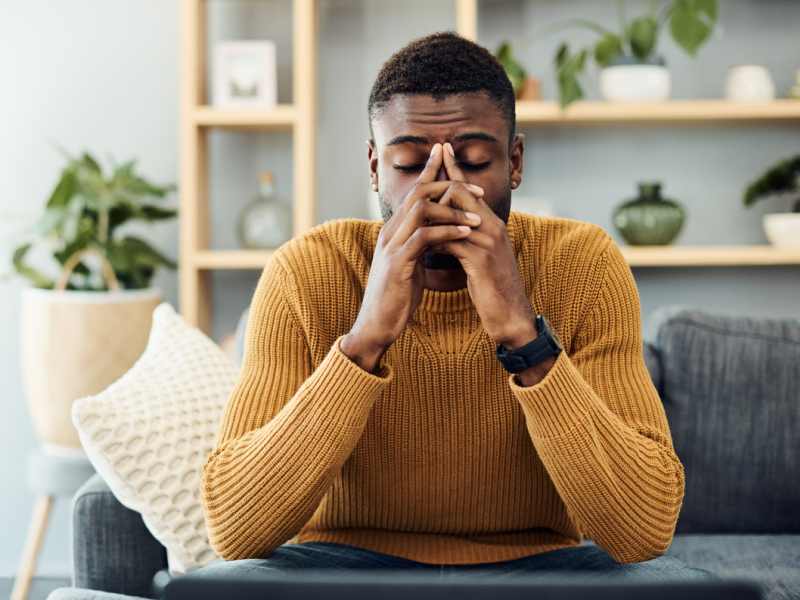
Table of Contents
Chronic Pain Can Be Brutal for Your Mental Health
Written By: Charlie Health Editorial Team

Clinically Reviewed By: Dr. Don Gasparini
Updated: October 23, 2023
5 min.
Mental and physical health are inextricably linked, meaning chronic pain often takes a toll on mental health.
Learn more about our Clinical Review Process
Table of Contents
Pain is a normal reaction from our nervous system that alerts us to possible injury. And, in most cases, pain goes away after an injury heals. However, chronic pain is different. Chronic pain refers to persistent pain, typically lasting more than three to six months, which can be caused by various medical conditions or injuries and can continue even after an injury has healed. If left unchecked, chronic pain can disrupt nearly every aspect of a person’s life, including work, school, relationships, and sleep.
Although the physical symptoms of chronic pain are among the most obvious, it’s important not to overlook the mental health impacts that can accompany this kind of pain. Mental and physical health are inextricably linked, meaning chronic pain often takes a toll on mental health. Below, we review some of the mental health effects of chronic pain, as well as interventions that can make it possible to manage chronic pain while working towards positive mental health.
How does chronic pain affect your mental health?
Chronic pain can have significant mental health effects, including the following:
Stress
Living with daily pain is incredibly physically draining and emotionally stressful. According to Mental Health America (MHA), stress changes the levels of certain hormones within the brain and nervous system, affecting your mood, thoughts, and behaviors. Chronic pain disrupts the body’s balance of these hormones, contributing to even higher levels of stress, which can then worsen the effects of chronic pain—a bivariant phenomenon dubbed by some researchers as “two sides of the same coin.”

Is chronic pain taking a toll on your mental health?
Charlie Health’s personalized intensive outpatient program can help.
Depression and anxiety
The hormone imbalances associated with stress and chronic pain are also linked with other mental health issues like major depression and anxiety disorders, research shows.
Social isolation
People with chronic pain may withdraw from social activities due to their discomfort, which can result in feelings of loneliness and social isolation. Research shows people with chronic pain are more vulnerable to social isolation, which can exacerbate physical and mental health symptoms.
Self-esteem
Feeling limited by pain can lead to a decrease in self-esteem and self-worth. Some people (especially young people) living with chronic pain might find it difficult to maintain relationships or carry out daily activities, which can lead to low self-esteem, research shows.
Sleep and mood disturbances
Chronic pain can interfere with sleep, causing sleep disturbances, insomnia, and fatigue. These kinds of sleep disturbances can in turn worsen mood and mental health problems, as sleep is linked with mental health.
5 tips on coping with chronic pain
If you or a loved one are living with chronic pain, help is available. The first place to start is healthcare professionals. Mental health treatment and physical health appointments with a primary care team are essential for finding a holistic treatment plan. Beyond that, there are many strategies and pain management interventions that can be taken to improve the quality of life for anyone with chronic pain. Here are five tips for coping with chronic pain:
1. Talk to your healthcare provider
Let your health care provider know that you’re experiencing chronic pain. Although chronic pain is common, not all healthcare providers have the expertise necessary to treat chronic pain patients. A pain specialist can help you cope with persistent pain using evidence-based interventions.
2. Work with a mental health professional
If your clinician does not initiate a conversation about your mental health while treating your pain condition, bring it up yourself. Asking for mental health help isn’t a sign of weakness; it’s a sign of strength. Your mental health is just as important as your physical health, and you may want to consider chronic pain treatment that incorporates talk therapy to ensure holistic results.
Talk therapy can help you find healthy coping strategies to manage chronic pain. For instance, research shows that cognitive-behavioral therapy (CBT) is an effective treatment for chronic pain, helping people manage co-occurring mental health conditions like anxiety, depression, or substance abuse disorder while finding ways to manage their pain symptoms. Sometimes, psychologists refer individuals with chronic pain to psychiatrists for pharmacologic therapies, such as antidepressants.
3. Lean on your support network
Connect with friends, family, or support groups to share your experiences and receive emotional support. Social connections can provide a sense of belonging and reduce feelings of isolation often associated with chronic pain.
For a more formalized source of support, you may want to consider a support group. Living with chronic pain can be isolating, but support groups can provide a valuable source of support for people with chronic conditions. Research shows that support groups can be especially helpful for those with mental health conditions, substance abuse issues, post-traumatic stress disorder (PTSD)—all of which can be common co-occuring mental health conditions with chronic pain. One way to find a support group is by visiting the National Alliance on Mental Illness (NAMI) website. Also, some mental health programs, including Charlie Health, incorporate group sessions into treatment.
4. Make healthy lifestyle changes
If you’re facing stressors in daily life, healthy lifestyle changes are key to building resilience. Getting enough sleep, staying hydrated, practicing mindfulness, and doing regular physical activity (if possible) can help you feel your best, giving you the energy to cope with stressful situations and maintain good mental health. Of course, chronic pain cannot be solved with these simple lifestyle shifts, but any way you can decrease stress is a net positive. These changes can improve your overall well-being and may help alleviate pain.

5. Practice self-care
Prioritize self-care by engaging in activities that bring you joy and relaxation, such as hobbies, reading, or meditation. Reducing stress and fostering a positive mindset can make a significant difference in how you perceive and manage chronic pain.
Contact us
If you or a loved one are struggling with the mental health effects of chronic pain, Charlie Health is here to help.
Our virtual intensive outpatient program (IOP) offers more than once-weekly support for teens and adults with serious mental health conditions and their families—including chronic pain patients and those dealing with depressive disorder and other conditions as a result of persistent physical pain.
Charlie Health’s expert clinicians use evidence-based therapies like cognitive-behavioral therapy (CBT) and mindfulness, which can help with pain management and symptom management for those with chronic pain.




